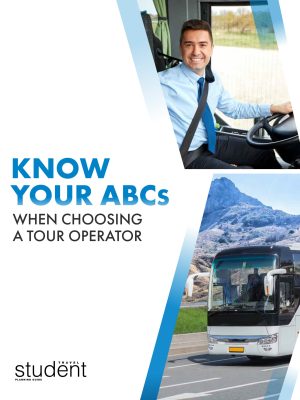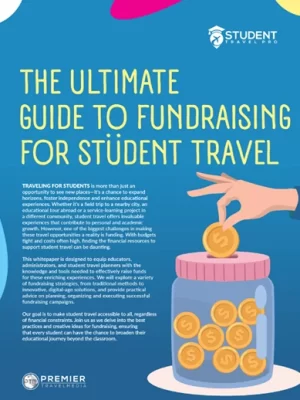Two student travel experts reveal some of the newer travel issues and what they do to sidestep them
By Lisa Shames
When it comes to traveling — and really a lot of other things in life — Murphy’s law gets it right. “Anything that can go wrong will go wrong,” as the adage goes, is something all explorers can relate to. From smallish snafus like lost luggage and missed flights to major ones (medical emergency, anyone?) and everything in between, the roads less traveled are full of potential potholes (literally, if you’re traveling by car or bus).
And when it comes to student travel the potential for problems goes up in direct relation to the number of students on the trip. To get some insight into not only some of the newer pitfalls to be aware of but also what can be done to prevent them, we spoke with two expert student tour planners: Michael Embrey, National Festival Director of FunME Events, and Keith Snode, COO of Kaleidoscope Adventures.
Cell phones and student field trips
For Snode, one of the more recent challenges he’s experienced on student trips has technology to blame. “It used to be when you traveled, you never heard from the parents you left at home,” he says. “Now that’s not the case because everybody has cell phones.”
Case in point: a parent who called the tour’s group leader when they got a message from their daughter that she was out of toilet paper in her hotel room.
“For us, it’s a mix of the trip directors getting calls from parents or parents reaching out to the travel company and asking about a situation,” says Snode. “It has created a new dynamic of communication between group leaders and travel companies in terms of having to handle those types of requests.”
Part of the solution to this problem has involved creating a higher level of communication with his staff and group leaders. “You never want to respond to anything from anybody in a group without the group leader knowing about it,” says Snode. “It’s helping everybody understand what their role is in the group travel experience — and that now includes the parent at home too.”
The advent of cell phones, however, isn’t the only culprit in this conundrum, especially when it comes to parent chaperones. “There’s been an increase of parents on trips who are becoming more vocal what they think about things,” says Snode, who looks at this as a societal shift. “Post-Covid, parents have become more aware of their child’s every move and mood.”
One of the best preventative measures for parent chaperone issues is setting clear expectations before the trip begins. “As a chaperone, you are responsible for all the students that I assign to you and not just yours,” says Snode. “It’s creating that expectation up front that, ‘Hey, while you are with me, I’m in charge and your student is no different from the others I am responsible for.’”
Setting student travel expectations
Another aspect of constant communication and setting expectations also comes into play when something does go wrong. Snode recalls a group trip last year when the flight got cancelled. His on-call team got to work, but by the time they got an update, part of the group had fractured off and took a van on their own and another part of the group took a car. Because of that it took a year to settle a claim that normally would have taken a month.
“It’s important to make sure the group, whether at home or in front of you at the airport, understands that everybody individually reaching out to try and solve the problem isn’t helping but hurting,” says Snode. “We have hired a travel provider that is there to help us fix these problems and you have to let that process work.”
And it’s not just the parents who need clarity. “When I was teaching, I used to have long conversation with my students a week before the trip explaining to them how they’re not just representing themselves, but their school and community too,” says Snode. “Because of Covid, there are a lot of new teachers right now who need to understand that that conversation is critical for students.”
Dealing with student travel fee increases
For Embrey, many of his student trips revolve around music performances, which can create issues all their own. Having a constant awareness of fee increases – a general problem and not limited to student travel — is one area Embrey has had to address more these days.
“You could take a saxophone, a clarinet and flute on an airplane as a carry-on, but when you start getting to tubas and cellos that’s more of an additional fee,” he says. “Now, you’ve just added probably another 200 dollars onto the event price just to cover the shipment of equipment.”
And that’s not just limited to air travel. “Domestically, when you’re doing bus trips, the same thing happens, and you have to make sure you have the right space underneath the motorcoach.”
One way Embrey combats the inevitable fee increases is by booking student trips to cities that typically have flown under the radar and offer lower rates all around. “These secondary cities provide great opportunities, be it Cleveland, Nashville, St. Louis, Branson, Kansas City or Denver,” he says. “Exposing these music directors to other cities has been a challenge for our company, but when they are, they see it as an educational opportunity.”

Learning what — and what not — to pack for a student field trip is crucial.
Student travel packing tips
When it comes to space limitations, it’s not just about the musical instruments. “Many teachers don’t how to tell kids how to pack,” says Embrey. “They don’t need to take 16 pairs of shoes. No swimming pool? Don’t take a swimsuit.”
Embrey and his team offer guidelines and rules on what to take and — more importantly — what not to take. For example, they advise not to bring a large bottle of shampoo or conditioner but rather just enough for their trip. Or perhaps not even bring it at all as many hotels offer that. Additionally, many of his student tour groups put three to four kids in a room. The roommates know ahead of time who they will be sharing their room with and can coordinate on items such as curling irons and hairdryers so not to duplicate.
Weather also plays a role in what students should include in their suitcases. “We always check the weather patterns and rain predictions, especially if they are doing an outdoor concert,” says Embrey.
Passports, or the lack thereof, is another concern for Embrey, who’s had to do some last-minute scrambling in the past for students who didn’t have one — or even for those who did. “If your passport doesn’t have at least 6 months longevity often you cannot travel,” says Embrey. “The agents are very firm with that.” To avoid airport snafus, Embrey requires the organization to provide photocopies of everyone’s passports for international travel ahead of time.
Food is another area that has seen changes over the years. “Years ago, we never had vegan, vegetarians or food allergies,” he says. “Now that has to be part of our booking profile.”
Recent changes in hotel policies and services, such as reductions in cleaning services, have also played a role in how Embrey and his team lead their tours. To avoid any issues, Embrey assigns one person to be the room captain. Their responsibilities include gathering all the room keys, making sure no items, such as towels, are taken, and ensuring the rooms are straightened up on a daily basis. “These are all life lessons for when they are adults traveling,” he says.
And when those inevitable problems do happen, Embrey has an answer for that too. “We have a 24/7 hotline so if they have a problem they can call or Skype with the person responsible for that tour.”
For more student planning tips, visit here and be sure to subscribe for FREE to Student Travel Planning Guide for all the latest information to help plan your next student trip.








